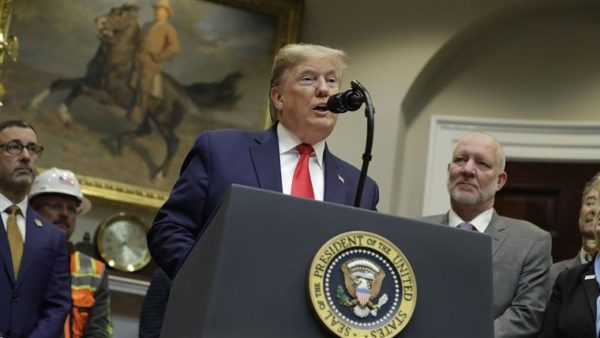
A mural featuring the face of former Democratic gubernatorial candidate Stacey Abrams is seen April 25 in Atlanta. (Elijah Nouvelage for The Washington Post)
BROOKHAVEN, Ga. — Republicans face a reckoning in the red-state suburbs that have long been a bedrock for the party, propelled by the stormy confluence of President Trump’s searing racial attacks, economic turbulence and frustration with government inaction after last weekend’s deadly mass shootings in Texas and Ohio.
The GOP lost its House majority in 2018 after it fared poorly with suburban voters, particularly women. Party leaders are increasingly alarmed that they have made little progress winning them back. Instead, Trump’s incessant feuds, his hard-line position on immigration — including federal raids that left children without their parents — and the stock market’s tumult amid his trade standoff with China threaten to further alienate suburban voters ahead of the 2020 campaign, even in states that have traditionally elected Republicans.
Republican leaders also worry that Trump’s dramatic policy moves and Twitter outbursts — such as last month’s racist remarks about four minority women in Congress — could prod more suburban GOP lawmakers to head for the exits rather than mount a defense, following in the footsteps of several Texas Republicans and others who have decided not to seek reelection.
“There is so much angst with these retirements and there is so much hope that President Trump would just talk about the economy for three days straight,” said Scott W. Reed, the U.S. Chamber of Commerce’s senior political strategist. And he warned that the Republican-controlled Senate could be at risk if the GOP does not make an “aggressive effort” to win the suburbs.
Democrats, meanwhile, are making inroads in places such as Atlanta’s northern suburbs, a longtime Republican enclave that once sent former House speaker Newt Gingrich (R) to Washington, by making targeted appeals on the economy, health care and gun control that address voters’ mounting fears about violence and instability.
The scene in Brookhaven, Ga., this week overlaps with suburban battlegrounds nationwide in states that were carried by Trump in 2016. Unease among suburban voters in those states over Trump’s conduct and the GOP’s limited steps on gun control has at times overshadowed Trump’s economic record, which most Republicans count on to lift them next year.

From left, Rep. Lucy McBath (D-Ga.), Rep. Ilhan Omar (D-Minn.), Rep. Sharice Davids (D-Kan.), and Rep. Ayanna Pressley (D-Mass.) pose for a photo before the start of the State of the Union address on Feb. 5. (Ricky Carioti/The Washington Post)

Lucy McBath, left, and her husband, Ron Davis, participate in a gun-control rally at the Georgia Capitol in 2013 in Atlanta. The family lost their 17-year-old son, Jordan Davis, to gun violence in 2012. (Jaime Henry-White/AP)
Rep. Lucy McBath (D-Ga.), an African American gun-control advocate whose son was shot and killed in 2012, narrowly won Gingrich’s former seat last year by building a diverse coalition that drew support from college-educated white Republicans who have drifted away from Trump — a campaign that Democrats nationally have called a model for more suburban gains.
McBath won “because there was massive pushback among some of my Republican friends against Trump, even if it meant putting in an anti-gun person,” Gordon Blitch, a 54-year-old independent, said this week outside a Lowe’s home improvement store in nearby Chamblee, Ga. “They saw larger issues at stake, and she helped herself by running a pretty smart campaign.”
[Rep. Lucy McBath, whose son was fatally shot, accused by Republicans of politicizing shootings]
Several suburban Republicans in Georgia’s 6th Congressional District said this week that they are open to hearing out the Democrats on guns, raising the prospect that the issue could upend the dynamics in America’s suburbs as Congress is pressured to act in the wake of the latest mass shootings.
“I’ve always supported the Second Amendment, and I grew up hunting with my dad, but you saw what happened over the weekend. It’s scary,” said aircraft worker Chad Staggs, a 52-year-old Republican, as he shopped at a Whole Foods Market. “I’ve got two daughters, and I don’t want to see anything happen to them. It’s simply out of control, and something has to be done on guns.”
Liz Chase, a retired teacher and Democrat who was shopping nearby, said residents of this bustling suburb, which is full of young families and manicured lawns, are unsettled and seeking reassurance.
“They’re afraid,” Chase said. On Monday morning, she said — the first day of classes at many of the district’s elementary schools — several parents stood “together in a circle at the bus stop, holding hands and praying that their kids would come home safely in the afternoon.”
For parents, said Jake Orvis, a McBath adviser, “their kids are in lockdown drills at school, they’re rightly horrified. They’ve seen Lucy’s story and they know she really is the district and not part of the usual partisanship that they’re tired of.”
McBath reminded the nation this week what led her to run for office and of her fight for stricter gun control.
On Wednesday, a staffer for the National Republican Congressional Committee, the House GOP’s campaign arm, accused McBath of “fundraising off the mass shootings” and doing “anything for a quick buck” — drawing scorn for using dismissive language about the mother of a black teenager who was shot and killed by a white man for playing his music too loudly at a Florida gas station in 2012.
“National Republicans are now accusing me of ‘politicizing a tragedy,’ ” McBath tweeted later Wednesday. “Let’s get something straight: I lost my only son to gun violence. I now dedicate all of my love for Jordan toward our fight for gun safety.”
McBath, who was traveling abroad on a congressional trip, was unavailable for an interview.

Supporters of Stacey Abrams sit outside the Ebenezer Missionary Baptist Church in Macon, Ga., during a 2018 event during her gubernatorial bid. (Melina Mara/The Washington Post)
Republican consultants are advising the White House to make the suburbs in Trump-won states — from the outskirts of Atlanta to the Philadelphia area to the wealthy hubs near Dallas — a priority as the president teeters from crisis to crisis and fight to fight. According to a CityLab analysis, a majority of the 41 seats flipped by Democrats in 2018 were “predominantly suburban.”
A Washington Post-ABC News poll released last month showed Trump’s approval rating among suburban men at 51 percent, with 46 percent disapproving. But Trump was deeply unpopular with suburban women, with 37 percent approving and 57 percent disapproving of his performance in office.

Rep. Will Hurd (R-Tex.) recently announced he will not seek reelection. (Melina Mara/The Washington Post)
Texas is widely seen inside the party as a flashing-red warning. Republican Rep. Kenny Marchant said Monday that he will not seek reelection to represent his Dallas-area district, leaving open a third Texas House seat heavily sought by Democrats in 2020. Marchant’s announcement comes days after Rep. Will Hurd (R-Tex.) announced he would not seek reelection in his district along the Mexican border and less than a month after Rep. Pete Olson (R-Tex.) declined to seek reelection in the Houston suburbs.
All three men won reelection in 2018 by five percentage points or less — in Hurd’s case, by only a few hundred votes.
[Rep. Kenny Marchant calls it quits, becomes 12th House Republican to retire]
Other GOP bastions, such as California’s Orange County, have seen a transition. Officials there said this week that the county has more registered Democrats than Republicans and has seen a surge of nonaffiliated voters.
Anxiety over the suburban outlook is seeping into conversations among top Republican donors. “There is concern with the unknown and what the next tweet is going to be and what that could mean,” said Spencer Zwick, a veteran financier who has advised House GOP leaders.
As gun-control talks take center stage in Washington, Rep. Brian Fitzpatrick (R-Pa.), a former FBI agent who represents suburban Philadelphia, said in an interview that “my message to my colleagues is: Don’t allow fear of special-interest groups to stop you from doing the right thing” and supporting expanded background checks and other gun-control measures.
“Whether it’s gun safety, the environment, or LGBT equality, you’ve got to run your own race,” Fitzpatrick said.
The Trump campaign has been paying attention to the Philadelphia suburbs and Trump’s gaps with suburban women. Last month in King of Prussia, Pa. — a short drive from Fitzpatrick’s district — it launched its 2020 Women for Trump coalition. The gathering featured Trump’s daughter-in-law Lara Trump, who touted the Republican overhaul of the nation’s tax code.
“Is your life better now than it was before Donald Trump got elected? Do you have a little more money in your bank account; did you get a break on your tax return this year?” Lara Trump asked the crowd.
David Wasserman, a political analyst with the Cook Political Report, said “King of Prussia is exactly the type of place that has moved away from the Republican Party.”
In Georgia, McBath’s ascent — along with the strong but unsuccessful gubernatorial campaign of Democrat Stacey Abrams last year — has given Republicans a new sense of urgency as they look ahead to 2020, when Sen. David Perdue (R), a prominent Trump ally, is up for reelection. It has also sparked a round of finger-pointing.

A sign supporting Abrams outside Atlanta in April 2019. (Elijah Nouvelage for The Washington Post)
“It was a disaster made by the outside Republican groups who lied to the president and lied to the candidates” about Georgia being solidly Republican, conservative activist Erick Erickson said earlier this month at an Atlanta gathering he hosted. “I don’t know where the money went, but it did not go to putting boots on the ground and winning the suburbs.”
Jessica Starr, a 30-year-old mother and unaffiliated voter, looked out at the shopping center around the Whole Foods in Chamblee this week. “You’ve got a changing culture around here,” she said, “young, successful couples, family oriented, but they’re not the kind of people carrying guns around. The baby boomers are still here, but the younger generation is kind of taking over.”
“This whole area is going a little more liberal, a little more to the left,” Brent Darst, a 48-year-old accountant and Trump supporter, said this week at the nearby Lowe’s. “Republicans are going to benefit from all of these Democratic presidential candidates moving over there, but that doesn’t mean you can take it for granted.”
Darst added: “I drive an hour to get to work. If you remind people that you’re the party that doesn’t want to take away more of your money, you’ll do all right.”
Toluse Olorunnipa, Mike DeBonis and Ashley Parker contributed to this report.


